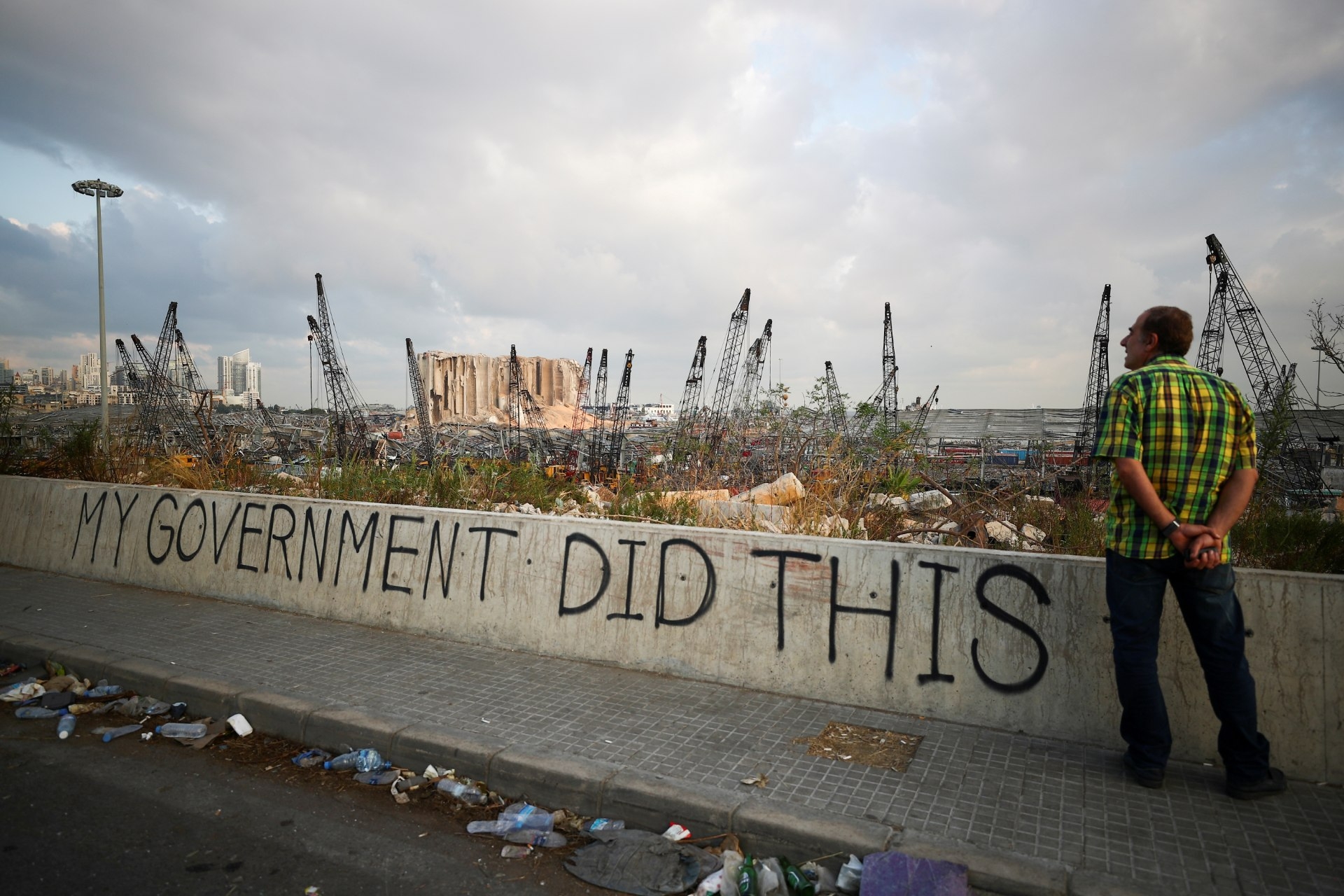Beirut explosion: Diab's government is gone. Here's what to expect in Lebanon

“God protect Lebanon. God protect Lebanon. God protect Lebanon.”
Lebanese Prime Minister Hassan Diab appeared distraught while reading his resignation speech on Monday evening.
His cabinet of mostly political debutants was unsuccessful in pulling Lebanon out of the mire, and a devastating explosion at the capital’s port that killed over 160 people and left thousands wounded was the last straw.
Diab said he knew corruption was rampant in the country, but he realised it was far greater than the Lebanese state itself. He blasted ruling parties for what he said were constant obstructions to reform efforts from his cohort, a sentiment publicly shared by many of his now ex-ministers.
Where does Lebanon go from now?
Stay informed with MEE's newsletters
Sign up to get the latest alerts, insights and analysis, starting with Turkey Unpacked
Political paralysis is not a novelty for Lebanon, which recently endured a two-year vacuum without a president.
But with 50 percent of the population below the poverty line, skyrocketing food prices and rampant unemployment with no economic bailout in sight, time is of the essence.
Middle East Eye takes a look at what to expect as politicians vie to form a new government.
Political consultations
Diab’s successor will not be elected by the people.
A new prime minister will be appointed by President Michel Aoun, following binding political consultations with different parliamentary blocs.
However, like most things in Lebanon, it is never all that simple.
Ruling parties hold side meetings prior to votes on key laws and decisions to appoint officials, away from official institutions. It is unclear what the chain of events would look like this time around, but ruling parties that played a minimal role in the Diab government are hoping to win back a large slice of the pie.
Parties that rival Hezbollah, like ex-prime minister Saad Hariri’s Future Movement, the Christian Lebanese Forces party (LF), and the Druze-led Progressive Socialist Party (PSP), all celebrated Diab’s resignation.
Again, it gets complicated.
With Lebanon desperate for financial aid to make its battered economy viable again, the United Nations and the International Monetary Fund, among other international organisations and states, will also want their voices to be heard as government formation talks are held.
Diab's successor
There is no clear successor to Diab so far, but local media have been introducing some of the usual suspects, notably his predecessor Hariri.
The Future Movement leader has been holding close consultations with other pro-Western leaders like the LF’s Samir Geagea and PSP’s Walid Jumblatt in recent days, perhaps signifying a renewed political alliance.
Before Diab came into the picture, Hariri changed his mind several times about leading a new cabinet, despite being backed even by political opponents Hezbollah and the Free Patriotic Movement.
Nawaf Salam was initially backed by pro-Western parties before Diab became premier.
The Lebanese jurist and diplomat would be seen as a major coup, not necessarily just for the United States, but perhaps for the international community at large which is trying to find a reason to be confident about shelling out cash to the economically devastated country.
It is rumoured that his name is already being mentioned in political discussions.
Muhammad Baasiri is an unfamiliar face to Lebanese politics, though as a former vice-governor of Banque du Liban, Lebanon’s central bank, he is a member of the financial establishment.
Prior to the explosion, tensions had already mounted between the Diab cabinet and several ruling parties, as well as United States Ambassador Dorothy Shea, who was issued a gag order banning her from speaking to local media.
Rumours had swirled that Diab’s term was done and Baasiri, both a friend of ruling parties and the United States ambassador, would be a perfect quick fix. It wasn’t meant to be back then, but perhaps it is now. His appointment might please Washington but not Lebanon's enraged protesters
Early elections?
Though scheduled for 2022, opponents of Hezbollah and its allies, as well as some protest groups, have backed early parliamentary elections, the only time the Lebanese people directly vote for their leaders.
Diab, angering Aoun and speaker Nabih Berri, said on Saturday that he would officially propose early elections to his cabinet, giving political leaders two months to agree on the terms.
His resignation does not automatically bring about snap elections, but his announcement will definitely pile pressure on Hezbollah, Amal and the Free Patriotic Movement to become more diplomatic about the idea.
Revolution?
The Beirut port explosion cast the country into shock, which transformed into grief and then anger.
Thousands swept into Downtown Beirut in sheer rage on Saturday. Diab’s resignation has not quelled that anger.
Though people were not gathered in their hundreds of thousands across the country like during the uprising in late 2019, the atmosphere in Downtown Beirut may be a catalyst for more street mobilisations.
While some protesters rioted on the night of Diab’s resignation, many were cautiously optimistic, seeing it as a small victory in a struggle against a rotten political class.
University student Lama Jamal Eddine told MEE that Diab’s resignation was a first step forward.
“It gave me hope that we’ll be able to achieve a secular and corrupt-free Lebanon,” she said with excitement.
“But I still want more. I’ll revolt until the parliament and presidency fall.”
Middle East Eye delivers independent and unrivalled coverage and analysis of the Middle East, North Africa and beyond. To learn more about republishing this content and the associated fees, please fill out this form. More about MEE can be found here.





